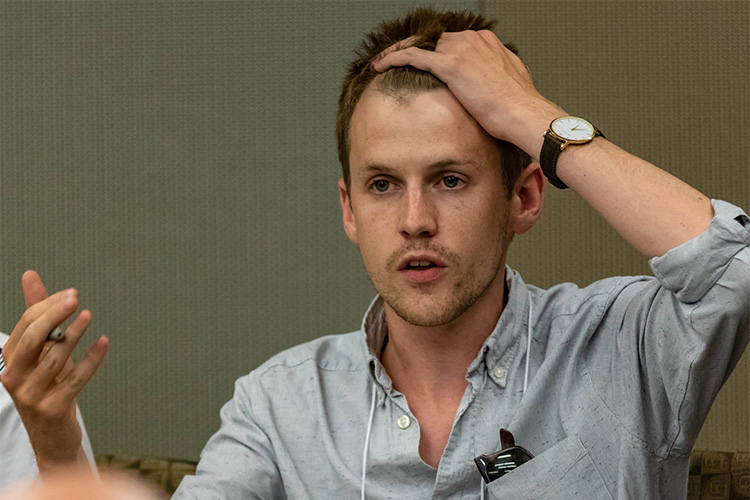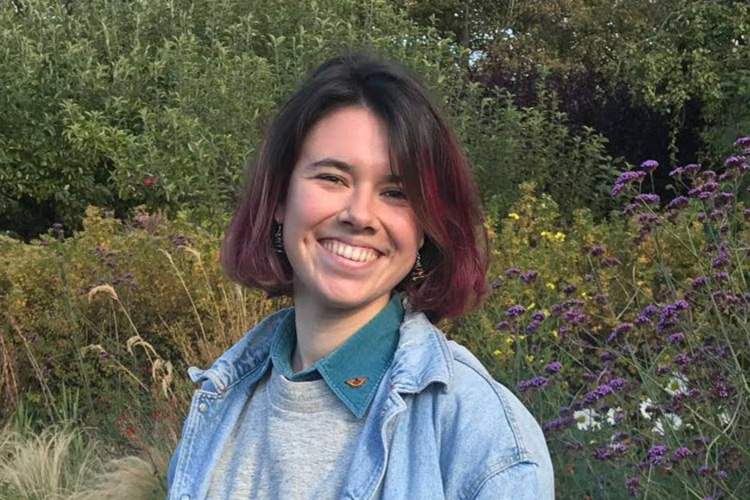Student testimonials
Rufaida Al Hashmi, Economics and Philosophy MA
What first attracted you to St Andrews?
I was attracted to how strong the Philosophy Department is at St Andrews. I knew it was one of the best places to study Philosophy as an undergraduate student. This coupled with how beautiful the town is made it the perfect place for me.
What was the best thing about studying Philosophy at St Andrews?
The Philosophy lecturers and tutors were the best thing about studying philosophy at St Andrews. Not only were they leading experts in their fields, but they were also very dedicated to their students. I was always amazed by how generous they were with their time. My lecturers and tutors would often meet up with me to help me improve my essay writing skills, to work through logic exercises, to explain a complicated philosophy paper, and to support me and give me advice in my graduate school applications. I really felt supported by the people that taught me in the Department.
What piece of advice would you give to new Philosophy students?
Be open to exploring different areas in philosophy. The way the degree is structured at St Andrews really allows you to take a wide range of modules in philosophy. I started off thinking I would focus on language and logic but then ended up doing political philosophy. And try immersing yourself in the philosophy community. There is so much to learn from the talks run by research centres like CEPPA and from your fellow students in the events run by the Department or the Philosophy Society. It was the philosophy community that made St Andrews feel like home to me and where I made lifelong friends.

Gillian Russell, Philosophy and German MA
I transferred into Philosophy after my first semester of courses in the subject. The department is small and friendly (like many departments in St Andrews) but it is also an outstanding department in academic respects; the teaching is excellent and it's a top-rated research department. I particularly enjoyed going on study weekends in the Scottish Highlands with staff and students. When I told my tutors that I wanted to apply for a place on a prestigious PhD programme in the States they were very helpful.
It is largely thanks to their teaching and support that I can write this from my office in the Philosophy Department at Princeton.

Kyriakos Petrakos, Conversion Diploma
What first attracted you to St Andrews?
During the course of my undergraduate degree in Economics, I developed a strong interest in the field of philosophy. Upon the completion of my degree, I sought to convert my major from Economics to Philosophy. The Conversion Diploma in Philosophy offered by the University of St Andrews provided me with the ideal opportunity to do so.
What was the best thing about studying Philosophy at St Andrews?
What I regard as the best aspect of studying philosophy at St Andrews is the efficacious teaching style members of staff at the Department of Philosophy employ. Along with interactive lectures, students are provided with the opportunity to engage with the curricula of their courses by partaking in weekly seminar discussions. These weekly discussions are student-led in that each student is provided with an opportunity to share their thoughts on the subject matter and to elaborately discuss them with their fellow classmates.
What piece of advice would you give to new Philosophy students?
One piece of advice I would share with any prospective Conversion Diploma student would be to fully engage in the collaborative and thriving environment maintained by the Department of Philosophy. Attending presentations and formal discussions held by the Department allows Conversion Diploma students to become accustomed to the field of philosophy in a notably pleasant manner, to learn the jargon and techniques inherent in philosophical discourse and, ultimately, to employ the latter when producing philosophical work of their own.

Jean Gove, Conversion Diploma
What first attracted you to St Andrews?
Looking around, St Andrews caught my attention for having the right amount of a lot of things. Apart from its excellent reputation as a university, it also ticks a lot of other boxes. The location and scenery make it impossible to not want to grab a book and read as you overlook the beautiful seascape. Furthermore, the relatively small size of the university instils a deep sense of community among peers.
What was the best thing about studying Philosophy at St Andrews?
When studying philosophy at St Andrews, you can be sure that you’ll be doing philosophy that’s happening ‘now.’ You’ll be taught by academics who are all currently contributing to their field. You won’t just be ‘taught’ the material, but also invited to ‘think through’ it, to engage, criticise, and develop on current theories and arguments. Maybe the best thing about studying philosophy in St Andrews is that you don’t study philosophy, you do it.
What piece of advice would you give to students thinking of applying for Philosophy?
My advice is to apply! Maybe email one of the lecturers - they’re more than happy to answer any questions you might have. But above all, be ready to go into the course with an open mind, ready to learn, challenge and be challenged!
Joe Bowen, PhD student
Thesis title
Why More Than Happens Matters: Robust Rights and Harmless Wronging
How would you describe the project?
My project focuses on the nature of and relationship between rights, wrongs, and harm. More specifically, my PhD examines a range of cases in which it appears one's rights against harm are violated by another's behaviour, even though this behaviour has done one no harm. I offer a novel, welfare-based explanation of why we have rights against harmless wrongs, which I call the Safety Condition.
What attracted you to St Andrews?
Three reasons stick out. First, the research strengths in moral philosophy across St Andrews and Stirling. Second, the department has a very supportive, friendly graduate community. Among other things, we have a weekly seminar (The Friday Seminar) where graduate students present their research, followed by the pub—this not only offers a great chance to see people, but means you know what everyone works on. (Most of us in St Andrews share offices in the same building, also, which helps make the PhD feel less solitary than it might otherwise feel.) Third, whether you're based at St Andrews or Stirling, the setting is beautiful.
How has the Department helped you with your research or to develop your skills and knowledge?
There is an awful lot of philosophy going on in St Andrews and Stirling—being part of that in a supportive community helps develop you as a philosopher. Beyond that, I've had an incredibly supportive supervisory team. Other members of the department have also been very happy to talk shop, look at drafts of papers, and prepare me for life after the PhD.
What do you hope to do after the PhD?
I'll be starting a postdoc in philosophy shortly.
What piece of advice would you give to someone thinking about doing a PhD in Philosophy?
Don't be precious about running your ideas and your writing past people.

Lara Jost, PhD student
Thesis title
Fighting Injustice: the Role of Emotions and Lived Experience in Knowledge Acquisition
How would you describe the project?
My project aims at providing a theoretical framework that includes experiential information coming from emotions and lived experience inside the current epistemological framework of contemporary analytical philosophy. I argue that such a framework is necessary to include and take seriously the knowledge production of members of oppressed groups. The project aims to bridge the gap between feminist standpoint epistemology and current dominant epistemological accounts in contemporary analytical philosophy in order to fight some forms of epistemic injustice faced by members of oppressed groups.
What attracted you to St Andrews?
I was attracted to the excellent level of academic research done by the department, the opportunity to be part of multiple research centres, like Arché or CEPPA, and the large and welcoming community of PhD students in philosophy.
How has the department helped you with your research or to develop your skills and knowledge?
The department has been great at offering a wide range of events, like talks and seminars that help me develop my philosophical knowledge. In addition, my supervisory team is encouraging and helps me conduct my main project in the best conditions, and is also supportive of my side projects. When it comes to professional development, the department is supportive of PhD students going to conferences and helps us financially to attend such events. Moreover, the department offers some tutoring opportunities (even in the first year of the PhD), which are important to help build a teaching portfolio if one wants to continue in academia. Finally, there are some student-led initiative supported by the department, like Minorities And Philosophy (MAP) and the Friday seminar, which are great opportunities to get to know other students and share our experiences and knowledge.
What do you hope to do after the PhD?
After the PhD, I hope to continue into a career in academic philosophy.
What piece of advice would you give to someone thinking about doing a PhD in Philosophy?
Take advantage of the opportunities the department offers. However, do not try to do everything! There are so many things available that it becomes easy to get lost and to forget about your main project. However, that's also the beauty of it. Sometimes, you start with a project, and it changes, as you discover new areas and new ideas that you had never thought of when you applied to the programme. Take the time to be nurtured by the opportunities you will get, and allow yourself to grow from the experience.
